Clark Gable, Loretta Young and Their Daughter Judy Lewis
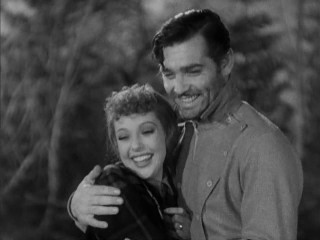 The story of Clark Gable and Loretta Young’s brief romance on the set of Call of the Wild and subsequent pregnancy is a sad one. Nowadays it is nothing at all, merely the typical day’s news, to read that an unwed celebrity is pregnant. Nobody bats an eye. In 1935, it was exactly the opposite. Clark was married, albeit in name only, to Ria at the time. So not only was unwed Loretta pregnant, she was pregnant with a married man’s baby.
The story of Clark Gable and Loretta Young’s brief romance on the set of Call of the Wild and subsequent pregnancy is a sad one. Nowadays it is nothing at all, merely the typical day’s news, to read that an unwed celebrity is pregnant. Nobody bats an eye. In 1935, it was exactly the opposite. Clark was married, albeit in name only, to Ria at the time. So not only was unwed Loretta pregnant, she was pregnant with a married man’s baby.
I probably get more emails and comments on the site, Facebook and Instagram about this Loretta Young situation than any other Gable topic. “He abandoned his child with Loretta” “He would never acknowledge his own child” “He turned his back on Loretta” Frankly it’s so tiring that I don’t often post pictures from Call of the Wild or Key to the City. I even delayed having these two films being Movie of the Week until now, because I knew featuring them meant the whole week would revolve around Loretta’s pregnancy and Clark’s “abandonment” of his child.
None of that is fair. What was he supposed to do? Up and admit it? Loretta sure wasn’t going to. They both had morality clauses in their contracts; they both would have been swiftly terminated, publicly scorned and ostracized. Loretta ends up with the short end of the stick, certainly, because she is the woman. She had to put her career on hold, be pregnant and give birth, all in secret, while Clark got to go on making movies, dating, living his life. But he couldn’t physically carry the baby and that’s not his fault. I have no doubt that if he had been single he would have married Loretta upon finding out she was pregnant. Heck, he married Kay when she got pregnant in 1955, even though he had publicly declared for years he’d never get married again. Alas, he couldn’t marry Loretta; his wife Ria would have dug her heels in, as she did a few years later when he wanted a divorce to marry Carole Lombard. At that time it took her two years (and a hefty settlement) to agree to a divorce. Loretta and Clark didn’t have two years to wait with that baby coming.
There’s been stories spread among tabloids in the past decade or so that Clark “date raped” Loretta, which really seems far-fetched. I believe these reports are all an attempt to vilify Clark and to protect Loretta’s image, that of course “womanizer” Clark would “prey” upon innocent, Catholic girl Loretta. The truth is, “innocent” Loretta was depressed during the Call of the Wild shoot because she had recently ended a lengthy affair with the married Spencer Tracy and was a bit nervous being around director William Wellman, since she’d had an affair with him years prior. And though only 22, she had already been married and divorced, having eloped at 17. Clark may have had an earned reputation as a ladies’ man, but Loretta was no naïve schoolgirl.
The fact of the matter is, the two principals in this tale–Clark and Loretta–are dead. Clark never got to tell his side of the story; Loretta only would tell it in print after her death. So to accuse one or the other of anything on a matter that happened over eighty years ago is pointless because none of us will ever know. It was a sad situation for all involved. Clark lost out at the chance to be a father, Loretta spent her life concealing a deep, dark secret and Judy was lied to for her entire childhood.
Ready to dive into this tale with me?
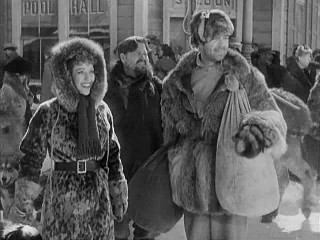
Production on Call of the Wild began in early 1935 and was long and tedious. The outdoor shoot in northern Washington state stretched on for weeks. A blizzard kept the cast and crew trapped in their cabins and sub-zero temperatures froze film in the cameras. Clark and Loretta apparently found another way to occupy their time. Director William Wellman complained that Clark “is more interested in monkey business than business” and said he came close to punching Clark out for causing delays but “I needed that handsome mug for the picture.”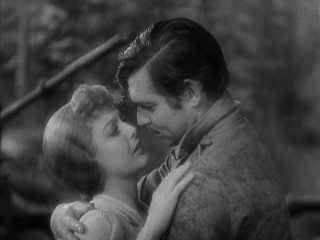
Loretta described Clark to Judy later as “Darling…sweet and very gentle. He had a good sense of humor, he made me laugh. He was a real man. Everybody loved him.” She later insisted that she had only “given into temptation” with Clark once. Her posthumous authorized biography states:
She had been wildly infatuated with [Clark Gable]–even more in “love” than she usually was, and no doubt more vulnerable, due to her recent breakup with Spencer [Tracy.] It was obvious by looking at their love scenes in the movie, that Clark returned her interest. The fact that he had been baptized a Catholic, despite his current illicit marriage, attracted her too. Perhaps she would be the one to place him–permanently–on a spiritual path.
However, as always, Loretta had maintained her moral principles. There had been no affair, as gossip mongers assume, instead, only one night when her iron will slipped. It would have been a casual event to many, especially in Hollywood, but she was ashamed…she had again failed to live up to her own principles. She vowed not to let it happen again.
There were other reports that Loretta was often holed up in Clark’s cabin with him during the lengthy location shoot. Well, whether it was just once or more than that, once is all it takes.
It was much to her shock and disbelief that she discovered she was pregnant a few weeks after the film wrapped, while she was filming “The Crusades” with Cecil DeMille back in Los Angeles. A devout Catholic, abortion was not an option for her, and she knew if she let anyone in the movie industry know about her condition she would be ostracized and her career would be over. She told only her mother, who was understanding and called a meeting with Clark. Clark was reportedly nervous and fidgety in the meeting, saying, “She was a married woman. I thought she knew how to handle herself.” He was apparently a bit weary that perhaps the baby was Spencer Tracy’s rather than his.
Shortly after, he left the home he shared with second wife Ria and moved into the Beverly Wilshire Hotel. He tried to call her and see her but Loretta wouldn’t take his calls and urged him to just leave her alone. “[He tried to see me] all the time. Constantly. He’d call the house. But I was always afraid someone would be listening. I’d ask him not to call. I was afraid all the time. Then we set up signals so I would know it was him but no one else would know. He even came to the set of ‘The Crusades’ to see me.”
When she started to show, Loretta and her mother left for a “vacation” in Europe for several months. When they returned, Loretta spent the remainder of her pregnancy hiding out in a small house in Venice. “When I came back, Clark told me that he had filed papers to legally separate from Ria. He thought that would make me feel better. It didn’t. Finally he said, ‘What do you want me to do?’ I could only cry and so he said he would go away on a trip to South America. I told him to go. I thought maybe if he were out of town, all the gossip would die down. I was frantic, I didn’t know what else to do. Ria knew I was back in town and she kept calling, telling Mama that if I just showed myself to the press all the rumors would stop. I couldn’t show myself. I was too big.”
One must understand that unlike nowadays, when TMZ, bloggers and tabloids follow celebrities around and dig for their dirty secrets, in the 1930’s stars were completely protected by their studios. Any bad news was spun by the studio publicity department. The gossip columnists and the magazine writers may have known the truth, but they fed the public the clean, sanitized version of their favorite stars as they were supposed to. Read pretty much any autobiography of a classic film star and they will relay how their drunken mishaps, bad marriages, homosexuality, abortions, etc. were all covered up by their studio press agents. And so, much was reported through 1935 about Loretta and her “mystery illness.”
Some snippets about Loretta starting in April 1935:
April 1, 1935:
Loretta Young’s new romantic lead, that is, off the screen, is Ralph Jester, the costume designer. Jester was formerly costume designer for Cecil B. DeMille until they had a quarrel recently. However, he is a frequent visitor to the DeMille set of “The Crusaders”—where Miss Young is emoting.
April 5, 1935:
When the sad tidings were conveyed to lovely Loretta Young that Spencer Tracy was returning to his wife Loretta sort of dropped for awhile. She became more or less dead on her feet outside the studio, but plunged into work on the set with so much energy each day that night found her dizzily tired. Loretta was merely trying to forget the charms of Spencer and she certainly needed someone to shake her loose from herself. Sooooo, along comes that silent wooer, Ronald Colman, and looks upon this gorgeous damsel with melting eyes, and presto, change, Loretta changes from a demure sad lady to a very happy and excited one. Now I am expecting fireworks of some sort, for ’tis said that George Brent is becoming another heart disturber in Loretta’s young life. And is Ronald jealous? He feels like bidding the handsome Irishman a touching goodbye. Whewie, is Ronald furious.
In August 1935, Motion Picture magazine decided to focus on Loretta’s single life with an article titled “No Wedding Bells for Loretta Young?”, which details how she works hard and cares for her siblings so has no time for marriage:
Today, Loretta Young looks at you with those steady blue-gray eyes, and–her lips unsmiling–she says: “I have no thought for the future except to live in peace and security. That is enough.”
…
“One thing I have always dreaded,” she told me quite honestly, “is loneliness. It’s like insomnia, harassing and fatiguing. I have experienced both. I know. And, strangely enough, the only time I was lonely was when I was married. To know what marriage could be; the close companionship, the perfect harmony and understanding, and not to achieve it–that is to know loneliness. But all that is behind me now. A family, especially a large one like mine, prevents one from becoming too self-centered. And it is only when a girl becomes wrapped up in herself that she begins to suffer.”
Interesting enough, in the same issue, they point out:
The days of dizzy diets are gone in Hollywood. The stars are eating and how! Del Rio goes for chops, green vegetables, pie, salad and tea at lunch. Clark Gable mangles steaks. Even Loretta Young, who usually eats like a sick bird, has developed a country appetite.
Well that may have something to do with the fact that she’s pregnant.
Loretta (in a pre-pregnancy portrait) appeared on the cover of Photoplay magazine in December 1935:
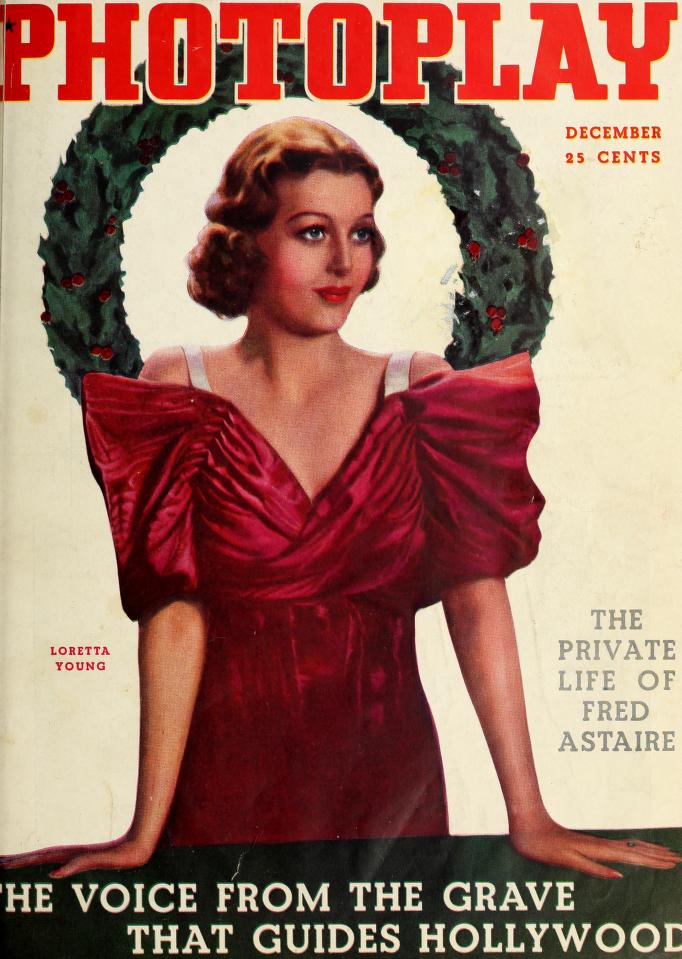
Judy was born in November 1935, but the fan magazines back then ran about three months behind so Loretta was being painted as gravely ill into the first part of 1936.
In a desperate attempt to quell the rumors that Loretta was pregnant or dying in some fashion, her studio Twentieth Century Fox agreed for Photoplay magazine reporter Dorothy Manners to visit Loretta for an exclusive interview. The article appeared in the January 1936 issue and was called “Fame and Fatigue: The real truth about the mysterious illness of Loretta Young.” Some excerpts:
Loretta Young is not suffering from an incurable illness that will keep her from the screen for a year or more! Her beauty has not been marred in a serious “secret” accident! She is not the secret bride of a secret marriage in retirement to have a secret child!
Well, no, she wasn’t a secret bride, but as far as the secret child thing goes…
Nor is she penniless, fundless, existing on the financial help of influential friends in a “pathetic” condition!
…
She is being very gay and gallant, this girl who is lying in the rose room with its glowing fireplace in her Bel Air home, saving herself, conserving her strength for the major operation she must eventually face.
This is the truth about Loretta Young’s mysterious illness:
Hard work, her great popularity that put her to the physical strain of making one picture immediately following another, capped by the climax of two strenuous roles in “The Call of the Wild” and “The Crusades,” has aggravated an internal condition from which Loretta has suffered from maturity. It has weakened her, sapped her strength in the great loss of energy; and an eventual operation is the only remedy. In her present rundown condition she is not ready for that operation. She may not be for months, perhaps a year! But as her strength returns, she will be permitted by her physician to return to the studio for one picture right after the first of the year! In fact, not-too-strenuous work is believed to be a good thing for her, far more beneficial than the weakening process of lying in bed too long. And by this argument she expects to report for work no later than the first of February! These truths about the condition of Loretta are directly from the girl herself to me, and to you, in the first interview she has been permitted since her illness.
“Of course,” she said, indicating the enormous bed with the rose satin cover in which she lay, “this becomes a little monotonous lying here so long, without seeing anyone. That’s the really bad part of the whole thing. I love having people about so much. And I’ve missed such exciting things like Sally’s wedding. But,” she laughed in mock-movie star tones, “I have my books, my thoughts and my cigarettes!”
How silly this is. The article states it’s telling “the truth” then never even says what her illness is! “An internal condition from which Loretta has suffered from maturity.” What does that even mean? She did indeed even miss her own sister Sally’s wedding. Sally got married downstairs in the living room, while Loretta was laying in an upstairs bedroom, with the door cracked so she could at least listen in.
She looked very small lying there, head almost buried in the big pillows. But she does not look worn or exhausted. She has been surprisingly lucky in not losing too much of her preciously acquired poundage put on during her vacation trip to Europe, “that wasn’t a vacation at all, but a mad tear from place to place and party to party!” She wore no make-up and the freckles across her nose looked cute and healthy! Near her bed, a table was stacked with the new magazines. A radio was at close reach.
…
We know that she is suffering the fatigue which her fame and fortune have cost her–but we know, too, that her spirit is alive and alert and will carry her out of her sick room, again glowing with health.
Hmmm….I doubt she looked “very small lying there.” There are no real answers in this article that claims it tells the truth. Looking back on this, it is hard to imagine that any fan fell for this tomfoolery!
February 1936:
Loretta Young, who was forced to take a vacation from picture work because of illness, is now able to take short walks, and is looking even more lovely than before. She will soon be back in films.
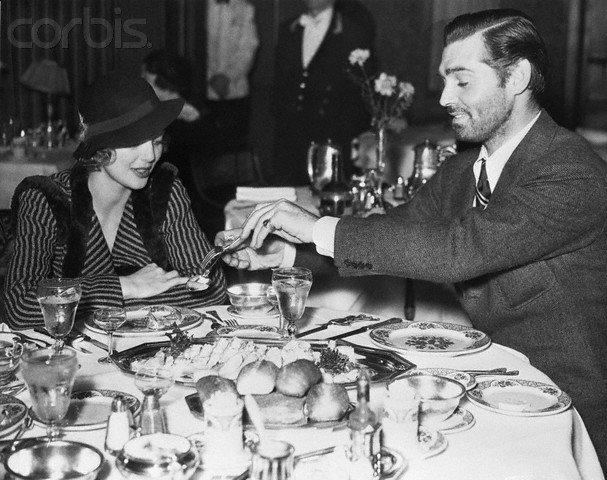
Judith Young was born in the house in Venice on November 6, 1935, blonde and blue-eyed, with her father’s ears. Only a doctor and Loretta’s mother were present at the birth. Clark was in New York at the time doing publicity for Mutiny on the Bounty. He received a telegram informing him that his child had arrived safely.
Immediately upon his return from New York, Clark phoned Loretta and said he wanted to see the baby. At first she lied and said that a nurse had taken Judy out of town and that he couldn’t see her.
Feeling guilty, she finally did let Clark visit baby Judy. It was nighttime, and he parked his car far away and walked to the back door of Loretta’s mother’s home. Little Judy was asleep in a dresser drawer. Clark held her and talked to her, even laughed a little at her ears. He gave Loretta a wad of cash that equaled about four hundred dollars and said, “At least buy her a decent bed.” “He loved you,” Loretta told Judy later, “He couldn’t keep his hands off you. He just kept holding you, he couldn’t stop.” Loretta told him she set up a private bank account that he could make deposits into for Judy if he wished and gave him the information on it. He just nodded. He never made any deposits into the account. Judy said later, “I ask myself why he didn’t leave me something. Forget money–even just a letter. It leaves me in the dark.”
By July 1936, fan magazines began to report that Loretta had recovered from her “recent illness:”
Fully recovered from her recent illness, Loretta has just completed work in “Private Number” for Twentieth Century Fox, in which she co-stars with Robert Taylor. Her telephone constantly transmits calls from Director Eddie Southerland, whom Dame Rumor insists she will soon marry.
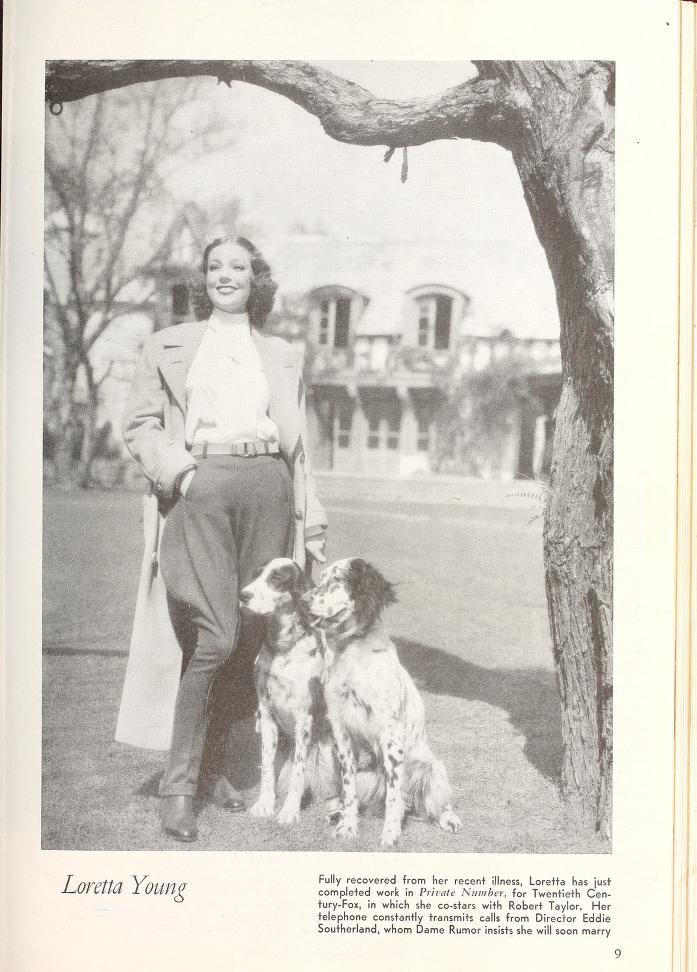
Little Judy was soon sent to stay at St. Elizabeth’s, an orphanage in San Francisco, where she remained until Loretta thought it the right time to “adopt” her. Loretta told Judy later, “I had to get you out of town. I was afraid someone would discover where you were. You had lots of company. There were other children to play with there. I traveled to see you several times a week. You were well taken care of and given a lot of attention.”
Loretta dove right back into making films. She was on the set of “Ramona” less than a month after Judy was born and made “Private Number,” “Ladies in Love,” “Love is News,” “Cafe Metropole,” “Love Under Fire,” and “Wife, Doctor and Nurse” in rapid succession.
The newspapers announced Loretta’s adoption of “Jane” (age 3) and Judy (who in reality would have been about 20 months not 23 months) on June 11, 1937: 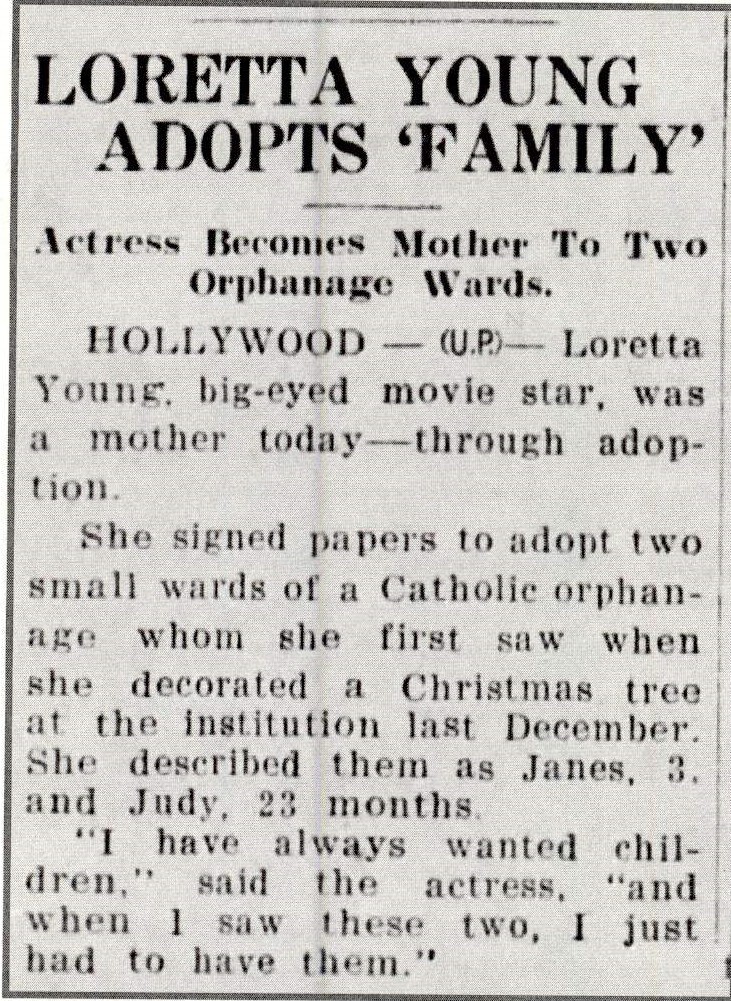
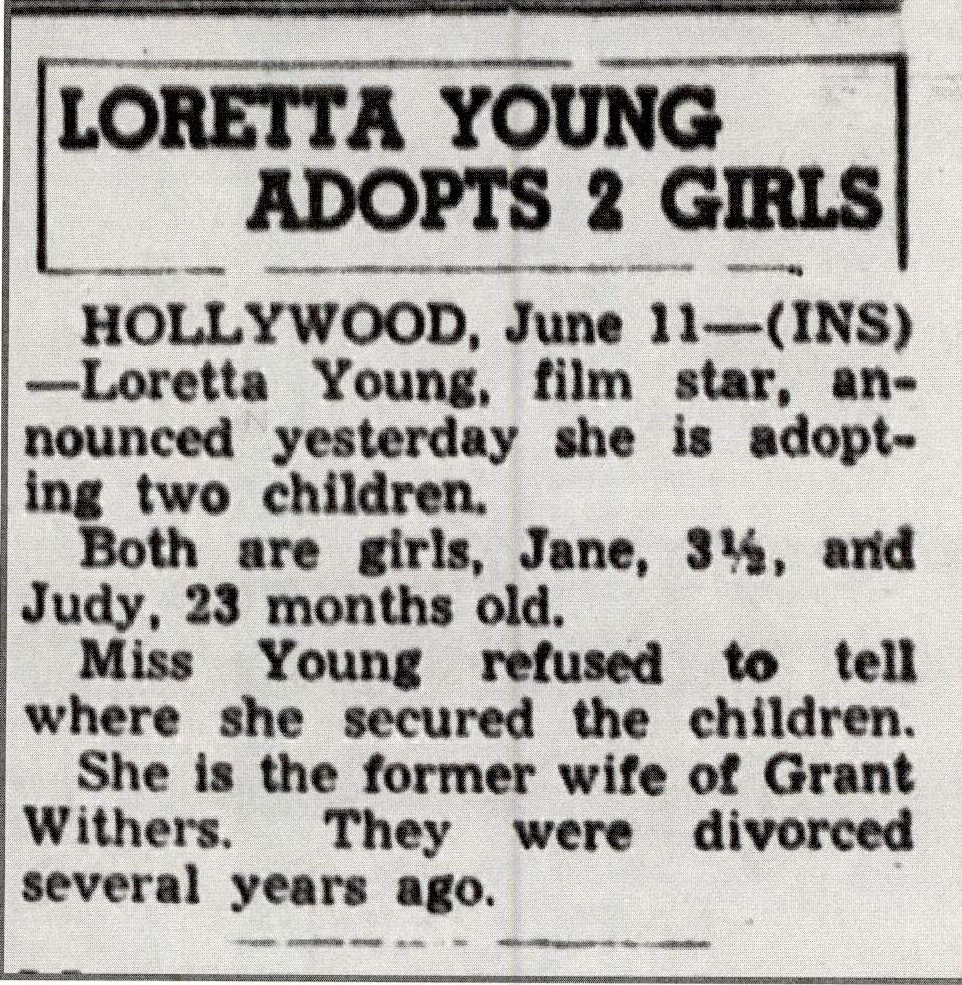
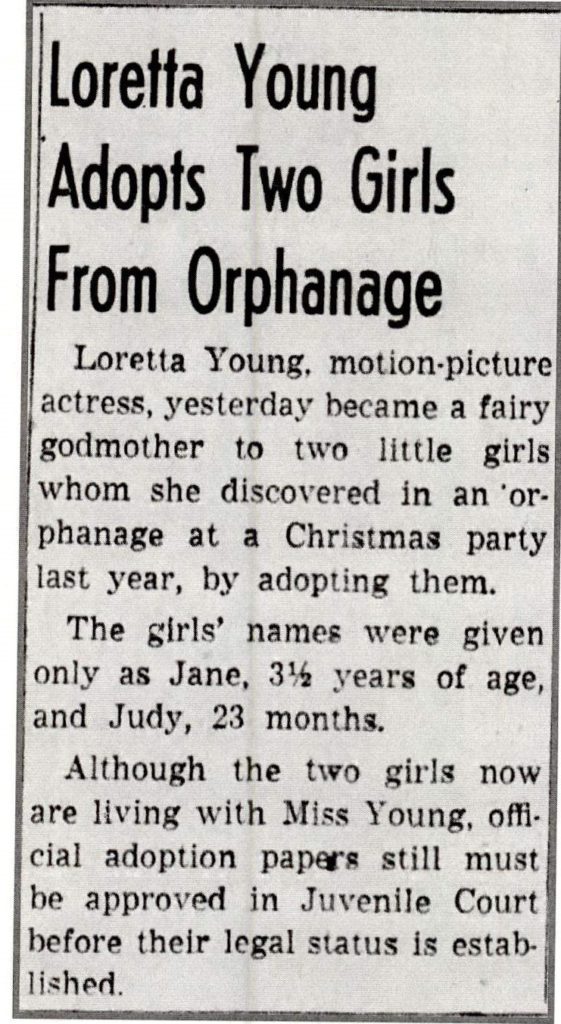
Of course, good ol’ Louella Parsons wasted no time in heading over to get the scoop (though I’m quite certain she knew the truth) in a syndicated newspaper article called “Stars Lavish Love on Adopted Tots: Loretta Young Latest to Assume Role of Motherhood”:
Loretta Young’s surprising adoption of two tiny little blonde girls last week was really top news.
This new mantle of motherhood was entirely unexpected.
Loretta is one of Hollywood’s most glamorous stars–a girl who has as many admirers as any other actress in our town. But parties, beaus, new clothes and trips to Bermuda were unimportant compared to Loretta’s enthusiasm over little Jane, aged three, and Judy, twenty-six months.
“They’re darlings,” she told me, “the cutest things you’ve ever seen. I can’t bear to go to the studio and leave them.”
“What about a photograph of you with the babies?”
“Oh no,” she said. “I don’t want them photographed—not yet. They’re so little and they shouldn’t have a lot of publicity while they are just babies. Come and see them as a friend, not as a newspaperwoman.”
Loretta was sincere, too, and her dislike of publicity for the two babies is reflected in dozens of other parents of adopted children in our town.
The article goes on to detail how overprotective and smitten a lot of Hollywood’s elite are with their adopted offspring.
The idea of the two girls being adopted at once was truly just to throw people off the trail that Loretta had given birth to Judy. Seems silly. By July 5, 1937, not even a month after the adoption was announced, it was printed that the birth mother wanted one of the girls back:
Loretta Young Seeks Child for Adoption
Screen Actress Loretta Young visited nurseries today in search of another child to adopt. The star revealed that she must give up one of the two babies she recently adopted. The child’s mother has asked for it back again after a trial period of adoption.
There wasn’t a lot of widespread coverage of this fact, either, I found only a few snippets.
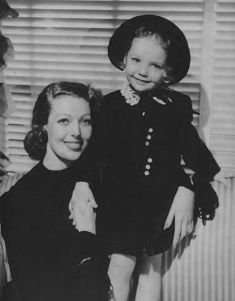
Loretta was still extremely paranoid that everyone would learn the truth, which is why she lied about Judy’s age, making her a bit younger than she actually was, so nobody would do the math and figure out that Judy would have been born near the end of Loretta’s “mystery illness.” Judy’s nurses were instructed to keep bonnets on her at all times to cover her “Gable” ears.
During this time, Clark had met and fallen in love with a certain Miss Carole Lombard. Loretta said later that she was heartbroken upon learning this, that she had held out the hope that perhaps they could still be a family. It seemed, though, that with all of her efforts to disguise the truth, she had made it easier and easier for Clark to disconnect completely from her and their daughter.
From this article in 1994:
After bringing Judy home in 1937, Young, says [Judy], proved to be an emotionally distant mother who was preoccupied with her career and left her daughter to be raised by nannies. An elegant beauty, Young married advertising executive Tom Lewis in 1940, and for a brief time Judy’s life was happy. Her stepfather showered her with books, ballet slippers–and the attention she craved. But after Young gave birth to sons Chris, now 49, and Peter, 48, Lewis lost interest in her, and Judy felt like an outsider.
She found scant solace elsewhere. Having inherited her father’s prominent ears, Judy was teased by schoolmates, who called her Dumbo. Young–who ordered nannies to cover her baby’s ears with bonnets–had Judy undergo cosmetic surgery at 7. “My mother was there the whole time and I had her all to myself,” she says. “That made the pain worth it.”
By the time Judy reached her teens, her relationship with her parents had deteriorated. Her stepfather, a heavy drinker, had, she says, taken to eavesdropping on her phone conversations and rummaging through her room. Young was often away–turning out movies like The Farmer’s Daughter (1947), for which she won a Best Actress Oscar. But even at a distance she managed to impose a strict curfew on her daughter.
Meantime, though most of Judy’s friends had heard from their famous parents that Gable was her father, nobody told her. Says producer Jack Haley, Jr., Judy’s first high school sweetheart: “I remember how eerie it was watching Clark Gable movies with Judy. You wanted to give her a nudge and say, ‘Hey, that’s your dad.’”
Years passed and in 1949, Clark and Loretta were proposed to costar in a new romantic comedy for MGM. Neither of them seemed to hesitate to star together in the new project, Key to the City, probably figuring that refusing to star together would just ignite old rumors as to why. By this time Loretta had been married for several years to Tom Lewis, had two sons with him and was pregnant with another child (though she sadly suffered a miscarriage on set). Clark and Loretta seemed to get along fine, with Clark nicknaming her “Slim.”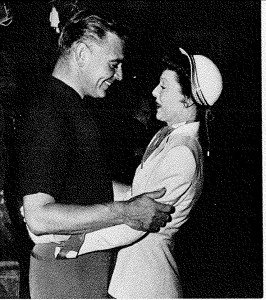
Judy (who had now taken her stepfather’s surname) recalls that around this time Clark came to see her at their home—the one and only time she had a conversation with her father. She arrived home from school to find him standing in the foyer. She didn’t think much of it, figuring he was there to see Loretta, but soon they were seated in the living room and he asked her about school, her interests, and if she had a boyfriend.
“I was surprised. Usually my mother’s friends paid very little attention to me. Their questions were always polite, but they weren’t interested in my answers, they just asked out of courtesy. But he was different. I could tell he really cared what I was saying. I liked him.”
He gave her a kiss on the forehead before he left and then was gone from her life forever. Loretta later denied that this meeting ever took place.
In 1958, Judy became engaged to Joseph Tinney. She had cold feet about the wedding and was starting to really wonder about her origins. All her life, she had heard the whispers. One of her childhood friends was Mary Frances, the adopted daughter of actress Irene Dunne. Mary Frances said to Judy once, “I’m adopted too, and I look nothing like my mother. Why do you look so much like yours?” Loretta had always deflected when Judy had asked about her real parents. Judy recalled, “I had always felt there was something people weren’t telling me. But every time I asked my mother, ‘Why didn’t my parents want me? Why was I adopted?’ she’d divert me. She’d say something like, ‘I couldn’t love you any more than if you were my own child.’ That stopped me.” Even Loretta’s husband, Tom Lewis, never got the truth out of her. When he had mentioned the resemblance of Judy and Loretta, Loretta had even gone so far as to hint to him that Judy was the illegitimate daughter of her sister Sally!
As Judy recalled in her 1994 memoir, Uncommon Knowledge, she became very upset when her and Joe went to the courthouse to apply for their marriage certificate and she had to write Tom Lewis down as her father, which she knew wasn’t the truth. She was also troubled that she didn’t have a birth certificate, only a baptismal certificate.
Later that night I told Joe, “I can’t marry you. I don’t know anything about myself. I don’t know who I am or what genes I’m carrying, or my medical history. I don’t know what I’m bringing into this marriage. You know everything about yourself, and I don’t know anything about me.”
We’d talked about this before and I had told Joe my suspicions about my mother being my real mother and I had also told him I didn’t know who my father was. She had told me about her relationship with Spencer Tracy, and I wondered if perhaps he might be my father, but I knew nothing for a fact. None of it seemed that important until now.
Joe listened quietly until I was finished and then he said, “You’re wrong. I know everything about you.”
“What do you mean? What do you know? I don’t understand.”
“It’s common knowledge, Judy.”
“What’s common knowledge? What are you talking about?”
“Your father is Clark Gable.”
“How do you know that? Who told you that?”
I was suddenly very angry, furious with Joe for knowing all along and not telling me and, at the same instant, furious with him for telling me. How did he know? Some part of me didn’t really believe what I was hearing, and yet it all made terrible sense–the operation on my ears, Gable’s visit…At that moment I hated Joe for knowing the truth that I had sought. He had held the key to my missing father all along, and he just casually tossed it out as common knowledge. All my rage and frustration, built up over the years, were now unleashed against my fiancé, instead of on all the people around me who had known and didn’t tell me, and of course the only person who could give me the truth—my mother.
“Who told you?” I demanded again. I didn’t want him to know how upset I was. I was fearful he wouldn’t tell me anything more, like all the others in my life.
He looked surprised. “Phil Krim told me.”
“Who’s Phil Krim?” My voice was calmer.
“He works at the Ted Bates agency. It was before I met you. He knew that Maggie Louis had set up the dinner party, and he said to me, ‘I hear you’re going to have dinner at Loretta Young’s.’ I said, ‘Yes! I’m going to meet her daughter.’ He said, ‘Well, that’s Clark Gable’s kid.’ And then I met you and you had those dark circles, just like him.”
“You had this information all the time I’ve known you and you’ve waited until now to tell me?” I was still in shock.
“It didn’t seem important until now.”
“It didn’t seem important! It’s the most important thing in my life, to know who my father is. How do you think it feels to have everyone around you know something as important as that and you don’t? I didn’t know anything about Clark Gable.”
Joe just looked at me and shook his head. “There’s no mistaking that you are your father’s child, Judy. It’s clear Clark Gable is your father.” he said it with such sincerity and conviction that I could no longer question it.”
Judy confronted her grandmother (Loretta’s mother) with the question of her parentage and was met with avoidance. Frustrated, she was desperate for answers. Judy decided to do some investigating for herself, starting with the wedding invitation list her mother had carefully constructed.
I scanned the alphabetical list of names until I found what I was looking for: Mr. and Mrs. Clark Gable. “Regret” was written in my mother’s handwriting.
…To this day I keep asking myself why I didn’t go directly to my mother and confront her, and my answer is that I knew without a doubt that she wouldn’t tell me. But the very fact that she had invited Clark Gable to my wedding when she had included none of her other leading men in movies was significant. In some strange way, seeing his name on the invitation list seemed to confirm what Joe had told me, and yet, odd though it may be, until my mother actually told me herself, years later, I really never knew for sure. Until I heard the truth from her, there was always a margin of doubt.
Judy and Joe were married as planned and the following year Judy gave birth to a daughter, Maria. On November 6, 1960, Judy’s 25th birthday, Clark Gable had a heart attack and was rushed to Hollywood Presbyterian Hospital. Judy was alarmed at hearing this news and at first wanted to rush to the hospital. She couldn’t bear the thought of him dying and her never having known him, of him never knowing his granddaughter. Every day she prayed he wouldn’t die. But he did, ten days later, on November 16, 1960. It was Maria’s first birthday.
It’s significant to me that my father died on Maria’s birthday. November 16 will forever carry a mixture of sadness and joy for me. It reminds me that while I lost my father, I also gained my daughter.
As I write these words I am surprised at the depth of the sorrow I still feel, and I now understand why this has been the most difficult chapter for me to write. There is probably nothing more wrenching to endure than the realization that what could have been will never be.
Judy became a television actress in the 1960’s; featured on a TV serial of “Kitty Foyle” and the soap operas “General Hospital” and “The Secret Storm.”
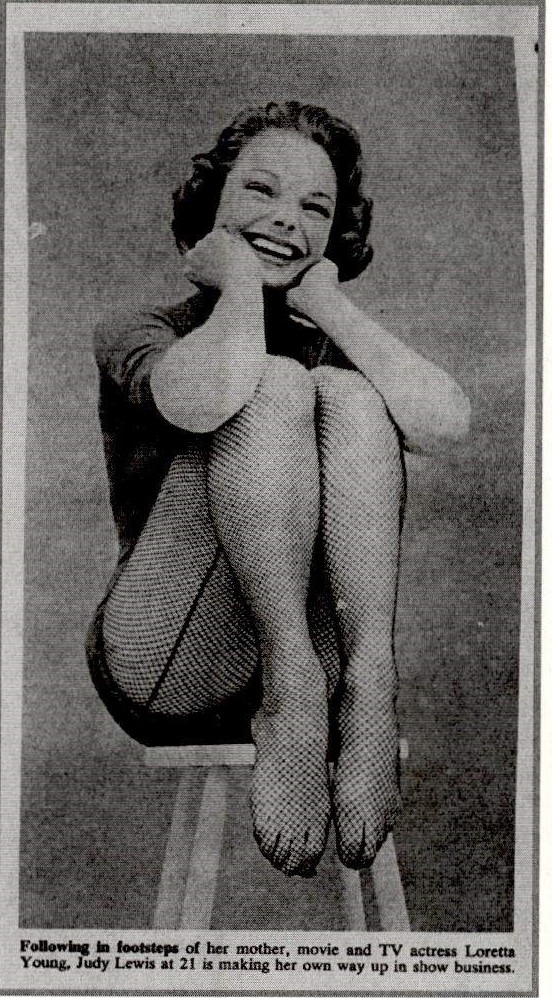
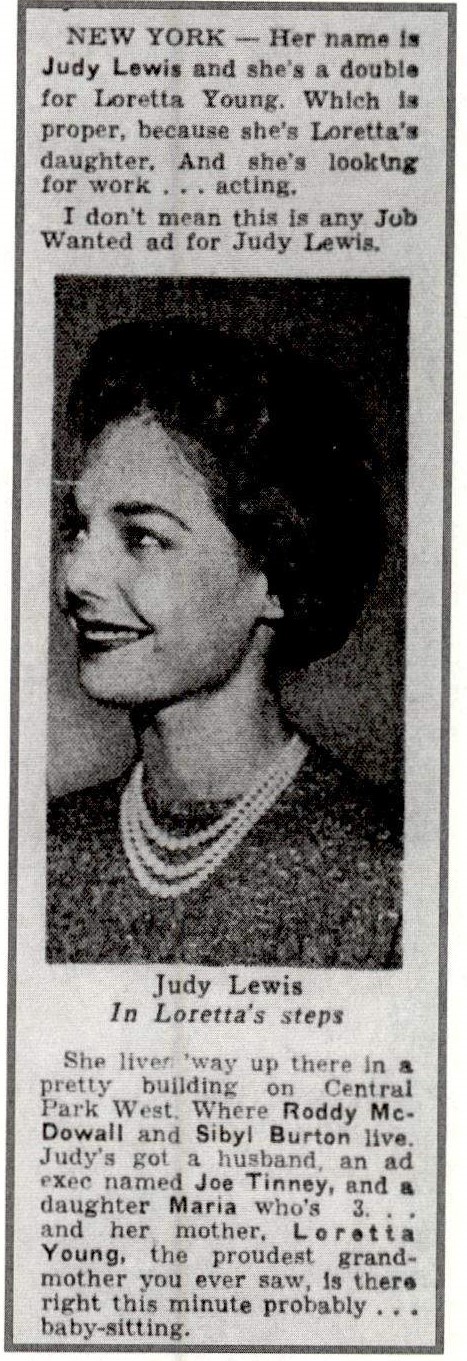
In 1966, “a ringer for her mother:”
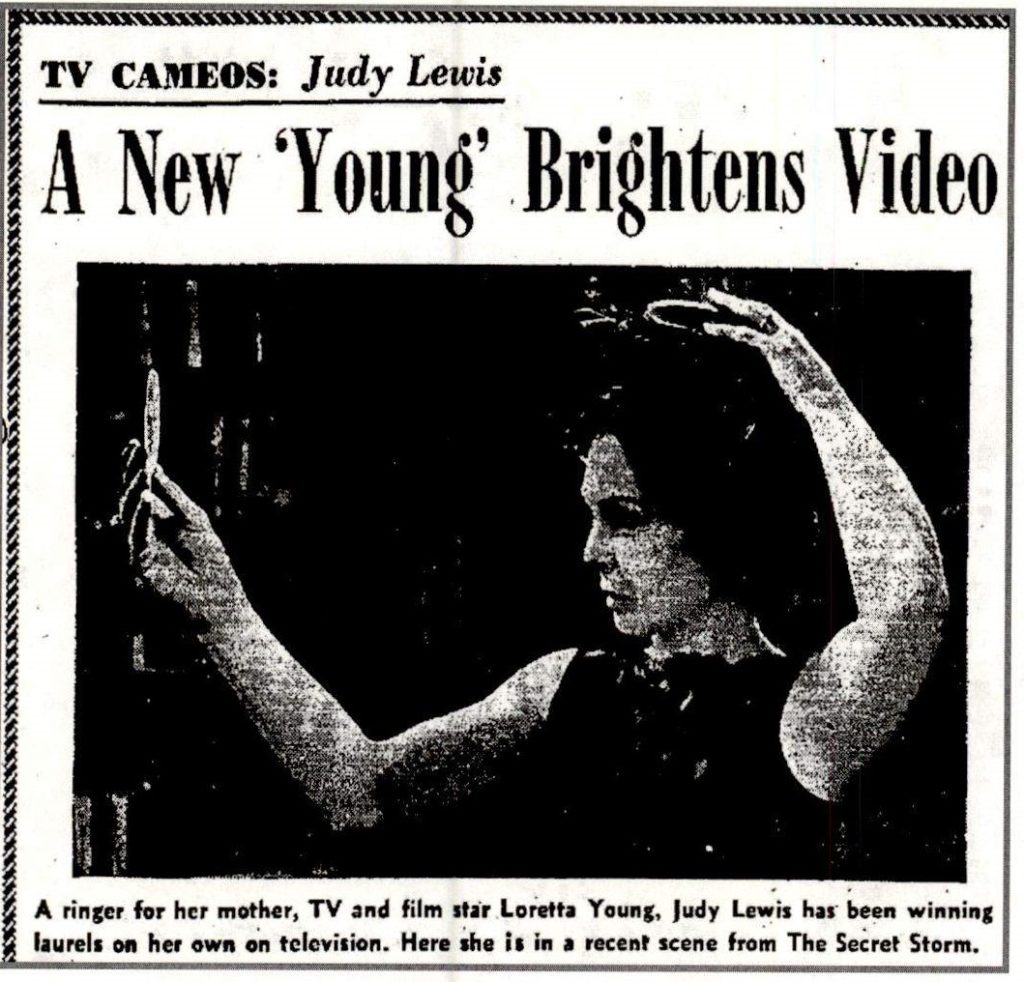
In 1978, accompanying this picture was a brief interview with Judy.
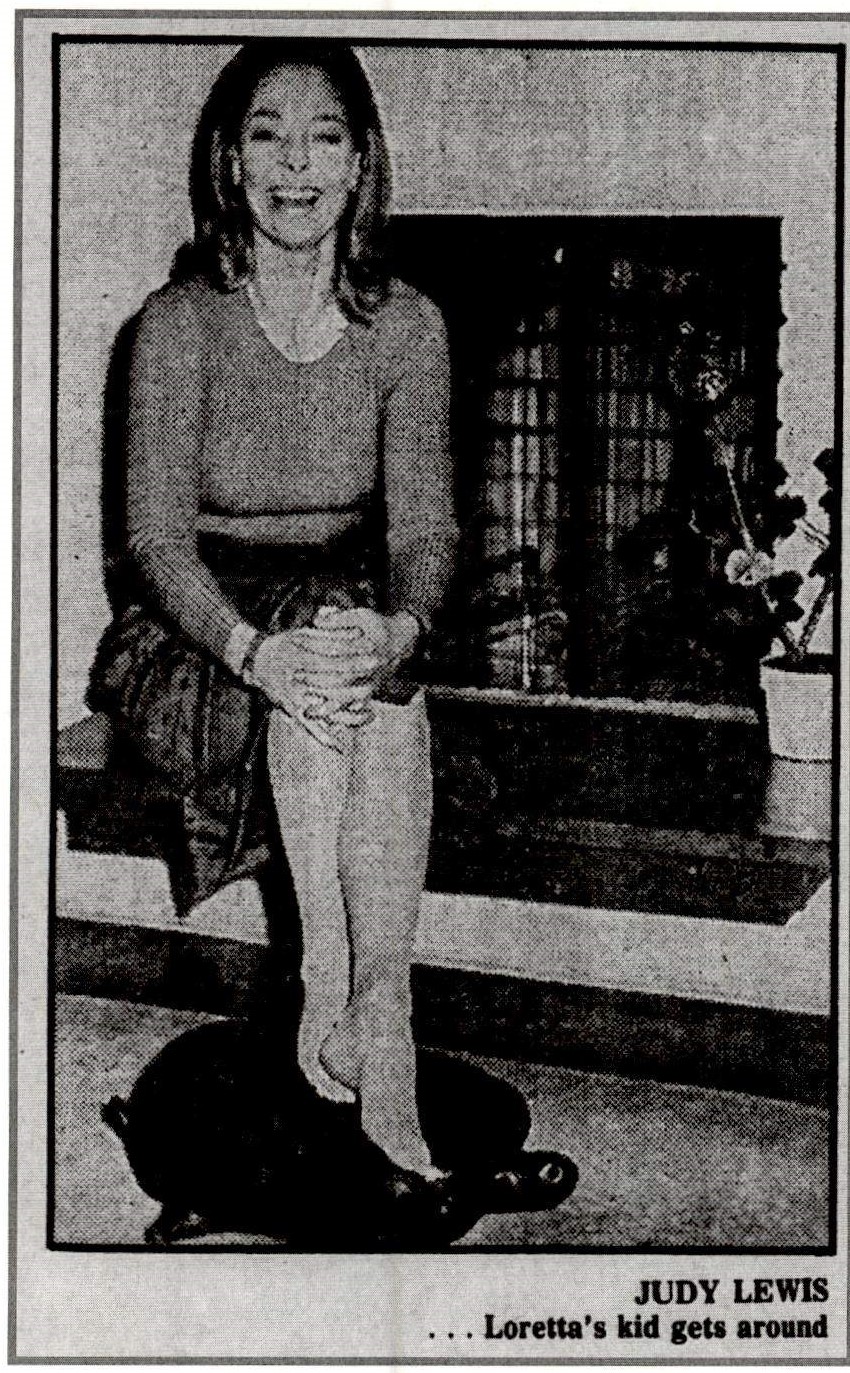
This snippet caught my eye:
Unlike most children of famous parents, Judy doesn’t seem to retain scars of parental antagonisms. When asked if she’s read excerpts from Christina Crawford’s forthcoming book about her mother Joan (both of whom worked with Judy on “Secret Storm”), Lewis shakes her head firmly and mutters that she can’t understand why anyone would expose such bitter memories. Lewis implies that her relationship with Miss Young may have not been the most blissful during Judy’s teen years, but “we were friends always,” Judy insists.
In another article from the same year, the author mentions that Judy “looks strikingly like her famous mother, especially around the eyes.” There is no mention of her being adopted in these articles; she is always mentioned as being the daughter of Loretta and Tom Lewis. It’s almost like everyone forgot to keep up the lie.

In 1966, Judy finally confronted Loretta.
As she tells it, “I was in a soap opera in New York and I had a few days leeway in there and my mother had told me she was going to go out of the country for a year. She was going to take a year off and travel around the world. And I was at a point in my life that I needed to know the truth. So I found about five days in my schedule and I flew to Los Angeles and she picked me up at the airport, and we had dinner together.
“And somebody was there at dinner so I couldn’t ask her at dinner. And then after dinner we went into her bedroom and she turned on the television and she knew why I was there. And I said, mom, I really have something that I want to talk to you about. She said never mind, never mind. We will watch this movie and the movie ended and finally it was about 3:00 in the morning, and I said to her, mom, this is important, I need to talk to you.
“And she excused herself and went into the bathroom, got sick to her stomach, poor little thing. And then she came out and I sat her down and I said now, mom, I have to ask you this: Is Clark Gable my father? And she said yes. And then we spent the rest of that morning — I heard about how she met him on the film and how they fell in love, how she was pregnant and how she had to hide her pregnancy, and the whole story came out. And we talked until dawn. She said that her biggest regret in life was ‘not getting your father to marry me.'”
In the 1980’s, Judy, pursuing a psychology degree, felt the need to further explore her history and began to consider writing a book. Loretta was strongly opposed to the idea and swore Judy to secrecy. Even after all those years, she was still afraid of being condemned. Judy felt the need to tell the truth. As she put it, “I have a daughter. And my daughter was married, and I have grandsons, two grandsons, and, it went — the secret went through generation to generation to generation. And I just couldn’t live with that. I also didn’t have any legal documents that stated that Judy Lewis existed in the world. So I had to state who I was once and for all. And that was the reason for the book.”
Loretta and Judy’s relationship deteriorated over the next several years, with Judy becoming more and more frustrated that Loretta wouldn’t claim her as her own daughter and with Loretta pushing Judy away.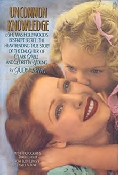
From this article:
On Mother’s Day 1986, Judy tried one more time to close the rift with her mother. When Young lost her temper and falsely accused Judy of writing a tell-all book, however, Lewis finally became furiously angry. “All the years of repressed emotions, of hurt and abandonment, came pouring out, she says. “I told my mom that all I wanted was to be accepted and loved–and if she couldn’t do that, why didn’t she give me to a family that could have?” Loretta, furious, ordered her daughter to leave the house and never return.
Before Judy left the house that night, Loretta taunted her, “I hope you do write a book so that I can sue you.”
“You can’t sue me for telling the truth!” was Judy’s response.
Judy’s autobiography, Uncommon Knowledge , was published in 1994 and became a bestseller. Judy did several television appearances to promote the book, but Loretta ignored all requests for interviews, simply stating, “No comment” and once stating ” [The idea of Judy being Clark Gable’s and my daughter] is a very romantic thought that many wish to believe. As I have in the past, I have chose not to give it further credence.” She admitted she only read her daughter’s book to page 60 and then closed it. She said, “I suspected that whatever I read might cause me to become bitter.”
Mother and daughter remained estranged until Loretta’s sister Sally’s funeral in 1997. For the first time in years they were able to speak to each other without fighting. Both had come to peace with their relationship by the time Loretta succumbed to ovarian cancer in 2000, at age 87.
Loretta only publicly admitted the truth of Judy’s origins to the author of her authorized biography, Forever Young , published just a few months after her death.
Judy died of cancer in 2011, at age 76.
I wrote this below when Judy died, and it still rings true:
Through this website and my research, I have attempted to get inside Clark’s brain, so to speak, to dissect the man. The whole Loretta Young-Judy Lewis situation is the one puzzle piece that just doesn’t fit his personality, and I know many Gable fans struggle with it. Clark detractors like to go on and on how he abandoned his child and his responsibility and left Loretta to the burden. It is hard to comprehend the panic and fear that both Clark and Loretta must have felt back then when compared to today where unwed pregnancy is commonplace. If Loretta’s pregnancy had been discovered, Clark and Loretta would have been Hollywood outcasts—both of their careers over and done with, no doubt about it. I honestly do believe that if he had not been married to Ria, he would have done the “right thing” and married Loretta, even though I don’t think he was in love with her. Can you imagine? I have wondered how that would have turned out. At least little Judy would have known all along who her parents were, and then Clark could have experienced being a father. He was essentially robbed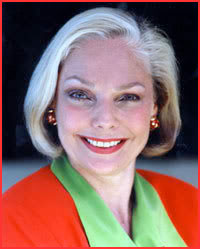 of that experience twice in life.
of that experience twice in life.
I don’t know why Clark never gave Loretta any money. I don’t know why he never tried to see Judy, even later in her life when she was an adult. I don’t know why Clark and Kay turned down the invitation to Judy’s wedding. Clark loved children and it seems very unlike him to turn his back on his own flesh and blood. My best guess is fear. Clark was always insecure about the public’s opinion and I think he was just too afraid. I don’t think that’s a grand excuse by any means, but that seems to be the case. Loretta and Judy were estranged for several years after Judy wrote her autobiography detailing her parentage, as Loretta was still so ashamed of her actions, even 50 years later.
It is a shame that Judy was denied by both her parents for most of her life. But I must say that she appeared to be a woman of both compassion and grace. Despite never being acknowledged by him, Judy attended events at the Clark Gable Museum in Cadiz, Clark’s 100th birthday celebration in Los Angeles in 2001, and did interviews about him in documentaries. She never came across as bitter, just as a woman who struggled to know who she was and was thankful to finally have an answer.
“My parents were two of the biggest stars of their time…The situation in which they found themselves in 1935 would not have posed a problem in the Hollywood of today. But their story was played out in a far more moralistic time and they dealt with what happened in the only way they felt was open to them. Unfortunately, their decision was not without cost to their child.”
Sources:
Uncommon Knowledge by Judy Lewis
Forever Young: The Authorized Biography of Loretta Young by Joan Wester Anderson
Clark Gable: A Biography by Warren Harris
Daughter of Deception, People magazine
Transcript: Judy Lewis Tells Her Story, Larry King Live 6/06/2001
Newspaper archives
Fan magazine archives
10 Comments
Barry Lane
An observation or two about why Gable did not participate in Judy’s life. First and foremost, he was clearly not wanted by Loretta. As for money, Loretta Yung was coining the stuff, she needed no financial help.
Mary Whittaker
Well written – thank you – but I’m afraid I’m one of those “detractors” who annoy you so much – sorry!
I agree that Loretta Young was no saint in all this… and she frankly strikes me as kind of a nut. I think the “date rape” story on the train is ludicrous myself…
As to what Clark Gable was doing married to either of his first two wives to begin with? Yuck. His “character” is pretty obvious. As to why he never contributed a dime? Why long after the Hollywood morality code ceased to apply he never made a discreet/private overture to acknowledge his daughter – or at least leave her a post death communication explaining his fears (if that’s what they were)? No excuses. I believe he would have greatly preferred abortion and when Loretta young chose against that it simply, in his mind, became her “problem” and he was free to go on with his life (and loves) with NO moral (or any other) responsibility to his daughter. Completely off the hook and easily able to rationalize it all away.
Certainly NOT his shining moment and I am also completely disgusted by his son’s later refusal to acknowledge her as well. Give me a break…. poor Judy. Her grace and maturity in dealing with so much rejection in all this is truly remarkable.
DMGAdmin
Oh no I don’t believe it is his shining moment either. Neither Loretta or Clark come off well in this situation. I just do find that people blame him for walking away, when I don’t think he had any other choice. By the time it would have been “ok” to admit to the whole thing, the 70’s, 80’s, 90’s, he was dead. 1960 was still not looking favorably on illegitimate children.
Clark’s first wives don’t really factor in here. Josephine was his acting coach and they only married so they could stay in the same hotel rooms. It was never consummated, not a love affair. She used him as much as he used her. She made all her money in subsequent years writing articles about Clark for magazines and teaching acting classes as the ex-Mrs. Gable. Ria blackmailed him into marrying her. He did lead her on certainly and she did help him in his early years, I doubt he was ever in love with her though.
DMGAdmin
I agree with you. I believe he thought that Judy was obviously well taken care of so he didn’t have to worry about it. The money would have been a tie someone could have drawn back to him.
There’s two camps of thought that have been printed–that either Clark and Loretta were deeply in love, or that they were just messing around on location and after one time, oops she’s pregnant. Either way, I don’t think Clark wanted to marry Loretta, but would have if he could have. Loretta pushed pushed pushed him away and it just became easier for him to completely detach. Then she blamed him for that.
Ginger
Thanks for your thorough research on this piece. All we can do is speculate on why things happened the way they did. As you noted, times were different then, and having a married man’s child out of wedlock would have been disastrous for Loretta’s career. I think the public would have forgiven Gable eventually. One thing that I think was true back then that still is true today is that the passage of time gives us an excuse to end relationships. Once we lose contact with someone, it is easier mentally to continue the status quo rather than to risk rejection by making contact again. I agree with you that Clark probably was afraid to risk rejection by contacting Judy later in her life.
June Ferris
Again, great article! This is the one I missed…..so glad to have found it. And thanks again for this superb site! I once tried to talk John Clark into checking it out. He was, as always, a complete “jerk” about it. I do, however, continue to hold Kayley in high regard, and was saddened by the news that her brother had died. Bless you!
philippe Ouimet
It was a long time ago so we can only speculate on their relationship . I will add my two cents worth….The studios were responsible for a big part in this terrible mess. If they had not tried to control everything the outcome of this romantic affair would have CERTAINLY played out differently. My cousin the actor who has long passed went by the name of Mark Stevens told me personally how some of those studios treated their actors back in those days. Bottom line most of us admired & loved Loretta Young & Clark Gable
kc
Lorretta Young got around hollywood from her early teens. She’d gone through many men, including one marriage at 16, by the time she got to Gable.
No saint is right
Lorretta Young got around hollywood from her early teens. She’d gone through many men, including one marriage at 16, by the time she got to Gable.
Alison
“I have no doubt that if he had been single he would have married Loretta upon finding out she was pregnant.”
I 100% agree with you. Many, many times I’ve sat and pondered the thought of what his life (as well as Judy and Loretta’s) might have looked like had he been able to do that and raise Judy.